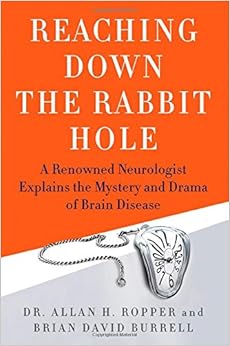"A must-read . . . Ropper and Burrell write with great verve and panache and each chapter reads like a detective story. . . . The narrative is peppered with insights into the scientific method, emphasizing that it’s not the cold, rational, Sherlock Holmes-like deductive process it’s often portrayed to be. This is medical writing at its best; in the tradition of Rouche, Lewis Thomas, and Oliver Sacks."
—VS Ramachandran,
New York Times bestselling author of
The Tell-Tale Brain and
Phantoms in the Brain (with Oliver Sacks), and Director of the Center for Brain and Cognition, UCSD
"Dr. Ropper comes through as the very model of a modern neurologist, an elegant combination of Fast Medicine and Slow Medicine, expert in the panoply of diagnostic techniques developed since Hippocrates: from clinical neurologic exam to MRI to neuropathology lab. What he models for us is the essence of good doctoring—attention, carefulness, and Oslerian dedication; he throws in, for good measure, his own irony and humor.
Listening to the Brain is well written and intriguing, deep but light; it reveals the complexity, the demands, the satisfactions and the regrets of what it means to be a true physician."
—Victoria Sweet, bestselling author of
God’s Hotel "Written with verve, style and compassion,
Listening to the Brain is an in-the-trenches exploration of the challenging world of the clinical neurologist. From the quotidian to the exotic, from the heart-breaking to the humorous, the authors present an honest and compelling look at one of medicine's most fascinating specialties."
— Dr. Michael Collins, author of
Hot Lights, Cold Steel "A fantastic contribution to helping us understand the ways in which our brains can go wrong. This peek inside the sick brain, by a foremost neurologist, helps readers truly appreciate how calamities like brain tumors, stroke, Parkinson's, seizures and other diseases affect us. His stories are sometimes painful, sometimes heartwarming, but invariably tremendously illuminating."
—Elizabeth Loftus, author of
The Myth of Repressed Memory "[A] bustling ballad from the front lines of medicine. . . . Walking the halls and emergency room of a major teaching hospital—[Ropper] is Oliver Sacks on horseback. This is a fascinating, sometimes brutal reality show of how disease presents, how diagnoses are made, and treatments rendered. Always at the forefront is dedication to doing what is best for the patient. . . . This book should be read by those with an interest in the brain, patients and families who struggle with life-threatening illness, and by all of us as potential sufferers who will appreciate the efforts made for them. It is a gem."
—Joseph B. Martin, M.D., Dean Emeritus, Harvard Medical School
















